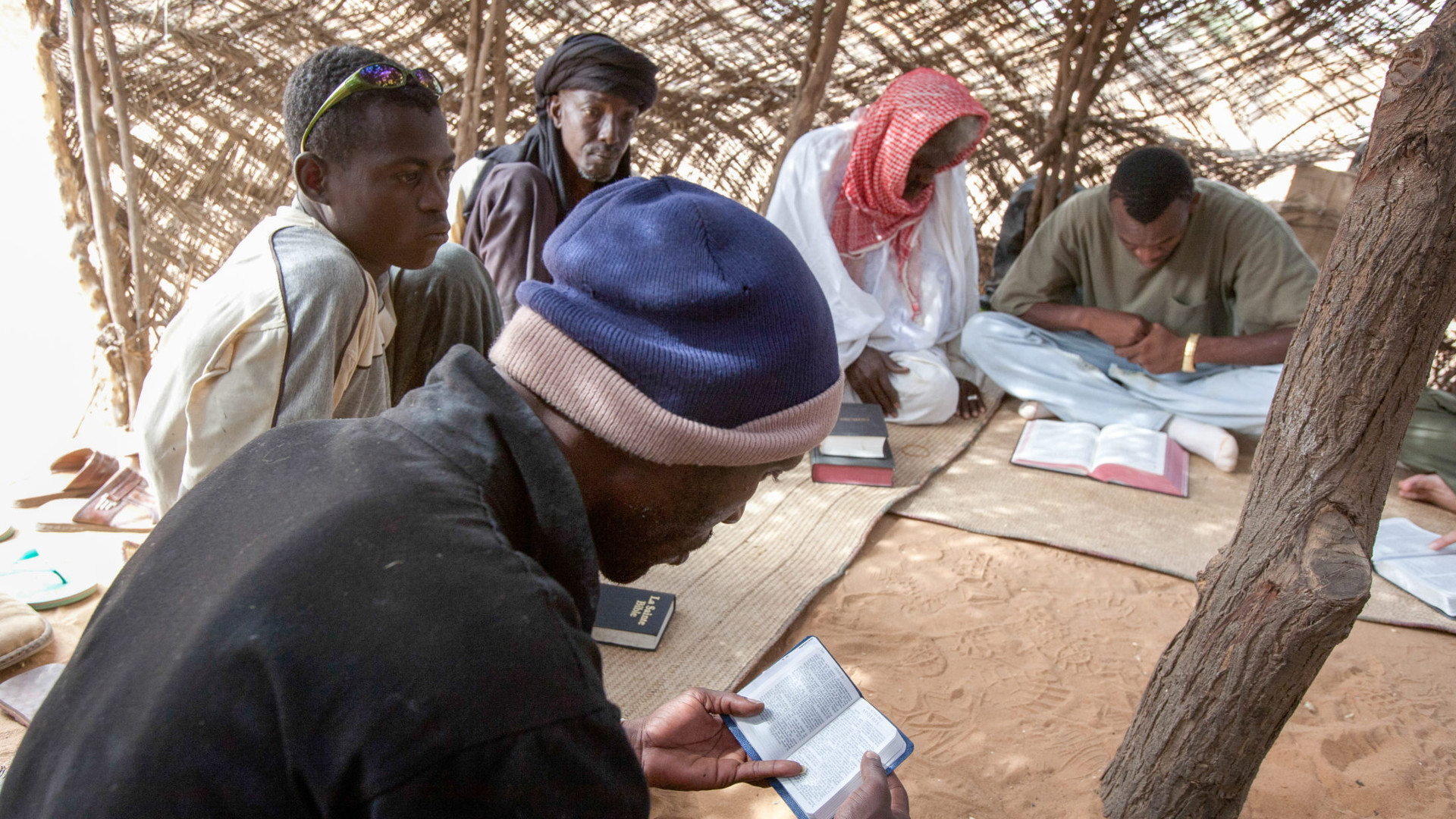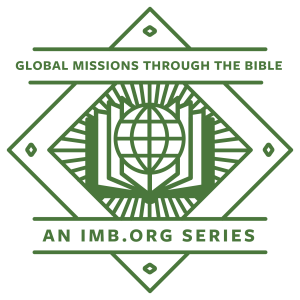
Editor’s Note: This article is part two of a three-part series highlighting God’s global mission throughout the Bible. (See part one here.) Although not comprehensive, this post examines key passages that underscore God’s heart for the nations in the Old Testament. Part three surveys the missions emphasis in the New Testament. Subsequent articles will focus on individual books of the Bible, showing their contributions to the theme of God’s global mission throughout Scripture.
 God’s Global Mission in the Law, the Prophets, and the Writings
God’s Global Mission in the Law, the Prophets, and the Writings
Okay, maybe not every sermon has to make an appeal to global missions, but every passage sits somewhere in the greater context of God’s global redemptive plan. Jesus said the Old Testament not only points to him, it also points to global gospel proclamation. Jesus himself declared this truth to his disciples in Luke 24:44–47.
Then he told them, “These are my words that I spoke to you while I was still with you—that everything written about me in the Law of Moses, the Prophets, and the Psalms must be fulfilled.” Then he opened their minds to understand the Scriptures. He also said to them, “This is what is written: The Messiah would suffer and rise from the dead the third day, and repentance for forgiveness of sins would be proclaimed in his name to all the nations, beginning at Jerusalem” (HCSB).
“Jesus himself declared that
the Old Testament not only
points to him, it also points to
global gospel proclamation.”
God’s Global Mission Is Seen in the Law
From the very beginning, God created the cosmos for the display of his glory. He gave a universal cultural mandate for everyone created in his image to be fruitful and fill the earth with his image (Gen. 1:26–31). That purpose hasn’t changed, though sin complicates things.
A pivotal question emerges in Genesis 11 about whether God’s judgment would remain upon the scattered nations. Chapter 12 answers that question and that connection acts as the thesis for the rest of the Bible. To preach chapter 11 without 12 is to state the problem without a solution. To preach Genesis 12 without Genesis 11 is like giving the answer without stating the question.
The rest of Scripture shows how God’s wrath and judgment were satisfied so people of every tongue, tribe, and nation would be brought near to enjoy God’s grace and extend his glory as restored image-bearers. Genesis 26 and 28 reconfirm God’s promise that Abraham’s descendants would be the conduit of God’s grace and glory to the all the nations of the earth. And the subsequent storyline affirms this.
In Exodus 12, non-Jews were welcomed into the family of God as part of the mixed multitude that fled Egypt with Israel. In Exodus 22–23, God’s people were commanded to have concern for the stranger in their midst. In other words, they were not to think that God’s blessing was meant for them alone but also for the other peoples who dwelt among them.
Deuteronomy 4 revealed a significant purpose of the law. It was not so that Israel alone could enjoy God’s grace but that the surrounding nations would also see Israel’s God and declare his greatness (Deut. 4:6–8). In other words, a major purpose of the law was to put the grace and glory of God on display to the nations.
God’s Global Mission Is Revealed in the Prophets
God’s plan for the nations is also revealed in the Prophets. At the start of Israel’s conquest of Canaan that began in Joshua 5–6, God stated that he was putting his glory on display before the inhabitants of the land. Joshua said that this was done so that “all the people of the earth may know that the Lord’s hand is mighty” (Josh. 4:24 HCSB).
Elsewhere, 1 Kings 10 gives us a picture of the nations coming to Israel as the queen of Sheba visited Solomon and blessed the wise and loving God of Israel.
The prophet Isaiah gave numerous visions of God’s glory declared among the nations (Isa. 2:1–4; 11:9–10; 12:3; 66:18–24), of God’s salvation and grace directed toward the nations (Isa. 19:19–25; 25:6–8; 42:1–9; 45:22; 49:5–6; 52:10; 52:15; 60:1–3), and of God receiving praise from the nations (Isa. 24:14–16a; 42:10–12). Read what God said of the coming Messiah in Isaiah 49: “It is not enough for you to be my servant raising up the tribes of Jacob and restoring the protected ones of Israel. I will also make you a light for the nations, to be my salvation to the ends of the earth” (Isa. 49:6 HCSB).
God rebuked Israel through Ezekiel, saying, “It is not for your sake, O house of Israel, that I am about to act, but for the sake of my holy name, which you have profaned among the nations to which you came” (Ezek. 36:22 ESV). God then promised in verse 23, “The nations will know that I am the Lord.” When he blessed Israel, it was for the sake of his glory among the nations.
Throughout the book of Amos, the prophet Amos pronounced judgment against Jews and Gentiles alike, as if to say, “God is not just God and judge over Israel, but also over the nations.” Micah prophesied of the day when nations would submit to the law and judgments of God (Mic. 4:1–3).
“When God blessed Israel,
it was for the sake of his glory
among the nations.”
Habakkuk foretold of a day when the earth would be filled with the knowledge of the glory of God as the waters cover the seas (Hab. 2:14). Zephaniah prophesied that all the people of the earth would serve the Lord with one accord (Zeph. 3:9). Haggai declared that the house of the Lord would be filled with the treasure of the nations (Hag. 2:7). And Zechariah predicted that the nations would seek the favor of the Lord and that God would reign over all peoples (Zech. 8:20–23).
The central message of Jonah is not “how to be obedient.” Rather, it displays God’s deep compassion for the nations as well as his stern rebuke for Israel’s failure to share his heart for the nations—even one so hated and cruel as Assyria.
God’s Global Mission Is Declared in the Writings
Finally, God’s purpose for the nations is revealed in the writings of the Old Testament.
The Psalms begin and end with a picture of God’s grace enjoyed and his glory extended among all peoples who fear him. Psalms 1–2 describe those who are blessed and include even the kings and rulers of the earth who take refuge in him (Ps. 2:10–12).
The last five Psalms, Ps. 146–150, also go together as hymns of praise. They don’t just tell us that the Lord is to be praised, but they tell us by whom he is to be praised, saying, “Kings of the earth and all peoples, princes and all rulers of the earth . . . let them praise the name of the Lord” (Ps. 148:11–13).
The worship of God is for every nation.
Nestled right in the middle, Psalm 67 fixes the singer’s thoughts directly on the Abrahamic covenant in Genesis 12. “May God be gracious to us and bless us and make his face to shine upon us, that your way may be known on earth, your saving power among all nations” (Ps. 67:1–2 ESV).
Lastly, the main point of the miraculous stories in Daniel is not just to teach “how to do civil disobedience,” or “how to stand for God in the face of persecution.” No, God spared his servants from death in the fiery furnace and the lion’s den so that gentile kings Nebuchadnezzar and Darius would denounce their false gods and worship the God of Israel. What’s more, these gentile kings decreed that the name of the Lord was to be feared among every people, nation, and language (Dan. 3:28–29; 6:25–27).
It should be no surprise, then, when Daniel 7 looked ahead to the day when the Son of Man will come with the clouds of heaven and “all people, nations, and languages” will serve him in an everlasting dominion, which shall not pass away (Dan. 7:14 ESV).
Our God is on mission, gathering a people from every nation who will enjoy his grace and who will extend his glory. This is true from the beginning of creation and all throughout Israel’s history.
And that’s just the Old Testament.
Robert Wells V is a graduate of The Southern Baptist Theological Seminary. He and his family reside in Virginia where he serves on a team that trains international church planters. They are currently preparing to a join church-planting team in Central Asia.

